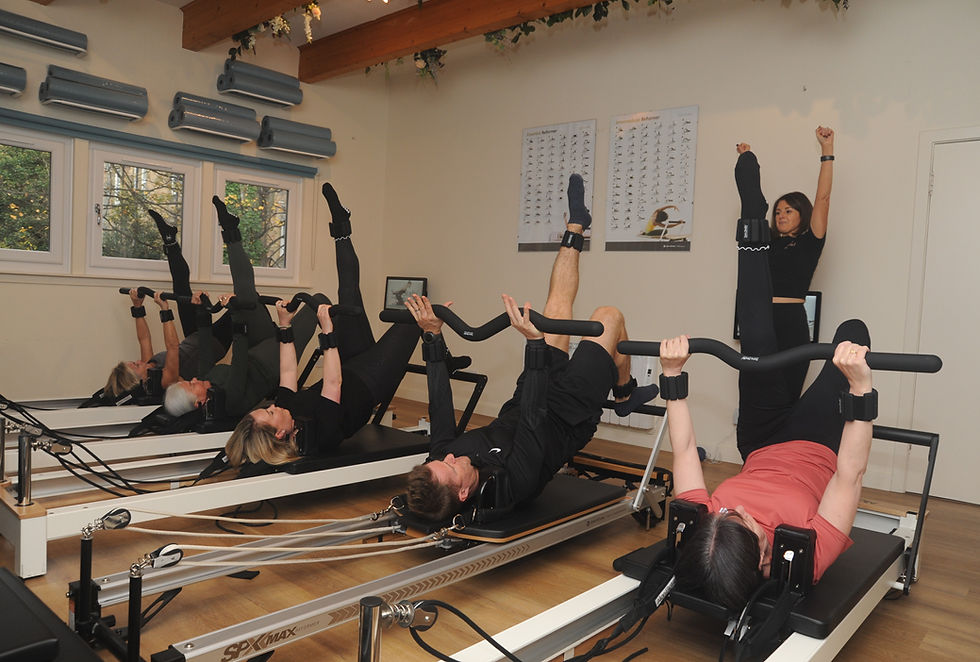Simple Practices to Boost Your Overall Wellbeing
- sanopilateswellnes
- Apr 16, 2025
- 4 min read
In today’s fast-paced world, achieving a sense of overall wellbeing can often seem out of reach. However, incorporating simple practices into your daily life can make a significant difference. Whether focusing on your mental health, physical fitness, or emotional richness, there are easy steps you can take to enhance your wellbeing.

Understanding Overall Wellbeing
Overall wellbeing encompasses various aspects of life, including mental and emotional health, physical fitness, and social connections. By focusing on these areas, individuals can improve their quality of life. Statistics suggest that those who engage in wellbeing practices report higher happiness levels and lower stress rates.
To boost your overall wellbeing, consider starting with small changes in your routine. You don't have to overhaul your lifestyle overnight. Here are some accessible, practical steps to begin with:
Simple Practices to Enhance Your Overall Wellbeing
1. Mindfulness and Meditation
Practicing mindfulness helps you become more aware of your thoughts, feelings, and surroundings. This can reduce stress and promote emotional resilience.
Daily Meditation: Set aside just 5-10 minutes daily for meditation. Sit comfortably, close your eyes, and focus on your breath. If your thoughts wander, gently bring your focus back to your breath. Apps like Headspace or Calm can guide beginners through meditation.
Mindful Moments: Throughout your day, take a moment to pause and breathe deeply. This can involve something as simple as feeling the sun on your skin during a walk or enjoying a cup of tea without distractions.

2. Physical Activity
Regular physical activity is crucial for both physical health and emotional wellbeing. It doesn’t mean you need to run a marathon; find an activity you enjoy.
Walking: Try to incorporate more walking into your daily routine. Walking for just 30 minutes a day can help reduce anxiety and boost your mood.
Mindful Movement: Pilates, known for its tagline "mindful movement," transcends physical exercise by fostering a deep mind-body connection. Each controlled movement, synchronised with breath, enhances body awareness and quiets mental chatter, creating a meditative state. This mindful approach improves strength, flexibility, and posture while promoting mental clarity, reducing stress, and extending inner calm into daily life. Restorative yoga is a gentle practice focused on relaxation and rejuvenation. It uses props to support the body in various poses, allowing extended holds. By promoting deep breathing and mindfulness, it fosters calm, introspection, and a deeper mind-body connection. This practice helps release tension, reduce stress, and cultivate inner peace. Its slow pace and focus on restorative poses make it accessible for all levels, providing a nurturing environment for healing and self-discovery.
3. What are the Four Parts of Health and Wellness?
Understanding the four areas of health and wellness is essential for developing a balanced lifestyle. They include:
Emotional: This involves coping with stress, expressing emotions appropriately, and developing a solid support system. Journaling can be a great tool to explore your feelings.
Physical: This focuses on maintaining a healthy body through regular exercise and a balanced diet. Aim for at least 30 minutes of physical activity most days of the week.
Social: Healthy relationships and social networks contribute significantly to overall wellbeing. Make time for friends and family, and nurture those connections.
Spiritual: This area involves finding purpose and meaning in life. Engaging in activities that reflect your values or beliefs can promote inner peace.

4. Nutrition and Hydration
What you eat plays a critical role in how you feel. Nutrition impacts your energy levels, mood, and overall health.
Balanced Meals: Aim for plates filled with a variety of colors. Including fruits and vegetables ensures you get essential vitamins and minerals. For example, leafy greens, vibrant fruits, and lean proteins should be staples in your diet.
Stay Hydrated: Drinking sufficient water throughout the day is vital. Dehydration can lead to fatigue and irritability, impacting your overall wellbeing.
Prioritising Sleep
Sleep is often overlooked but is crucial for maintaining overall wellbeing. Lack of sleep can lead to various health issues, including reduced cognitive function and increased stress levels.
Establish a Sleep Routine: Go to bed and wake up at the same time each day to regulate your body's clock.
Create a Relaxing Sleep Environment: Keep your bedroom dark, quiet, and cool. Avoid screens for at least an hour before bedtime to promote better sleep quality.
Embracing Gratitude
Practicing gratitude can significantly impact your mental and emotional health. Focusing on positive aspects of your life can enhance your mood and reduce feelings of anxiety.
Gratitude Journals: Consider maintaining a gratitude journal. Each day, write down three things you are thankful for. Over time, this can foster a more positive perspective.
Express Gratitude: Take time to express your appreciation to others, whether through a simple thank-you or a heartfelt note. Positive interactions can strengthen relationships and improve your mood.
Nurturing Connections
Human connections are integral to overall wellbeing. Engaging with friends, family, and the community can enhance emotional resilience.
Join Clubs or Groups: Engage in activities that interest you, whether it's a book club, fitness class, or an art group. Meeting like-minded individuals can lead to meaningful relationships.
Volunteer: Helping others can boost your mood and create a sense of purpose. Look for local opportunities that align with your passions.
Developing a Balanced Routine
Crafting a balanced routine incorporating these practices can be transformative. Aim for consistency without overwhelming yourself.
Set SMART Goals: Specific, Measurable, Achievable, Relevant, and Time-bound goals make it easier to track your progress. For example, aim to meditate for 10 minutes daily for a month.
Monitor Progress: Keep a journal to log your activities and feelings. Reflecting on your journey can help you stay motivated and adjust as needed.
Incorporating these simple practices into your life can enhance your overall wellbeing. Remember, small changes can lead to significant results over time.
For additional resources and support on your journey to improved wellbeing, explore more about health and wellness.
Final Thoughts
Improving your overall wellbeing is about creating a balanced life that meets your physical, emotional, and social needs. By implementing simple, actionable practices, you can foster a sense of peace and fulfillment in your daily life. Start small, be patient with yourself, and enjoy the journey to a healthier, happier you!




Comments